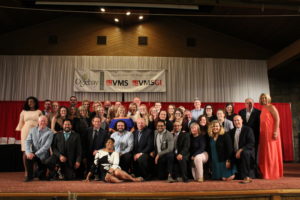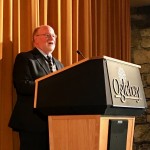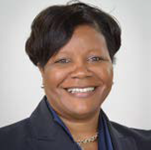iCommit – Just a Few Days Left!

The iCommit member referral campaign is winding down. There are just 19 days left (campaign ends on June 30) to sign up new members to our community!
With your support, we have now added 57 new members due to your referrals.
For each new member you refer, your name will be entered in a raffle to win great prizes! The current leaderboard is shown below:
- Carol Wallace – 17 – group members
- Mount Allen, CVE – 15 – group members
- Alexis Berggren – 8 – group members
- Bill Bavirsha – 1 – professional
- Jason Beckett – 1 – allied
- Sara Blayne – 1 –professional
- Gabriella Calicchio – 1 –professional
- Kathryn Carlson, CVP – 1- young professional
- Shannon Caudill – 1 –professional
- Kenny Gaudinez, CVP – 1 – student
- Paul Hanson – 1 – young professional
- Troy Hoberg – 1 – allied
- Dwight Johnson – 1 – young professional
- Bryan Jones – 1 – professional
- Billy Langenstein – 1 – young professional
- Terri McGilbra – 1 allied
- Steve Miller – 1 professional
- Jennifer Norris – 1 professional
- Robert Olson – 1 – professional
- Andy Pate – 1 – professional
- Kate Pierro – 1 – young professional
- Lynda Reinhart – 2 group members
- Patrick Rice – 1 – professional
- Chris Sanders – 1 – professional
- Timothy Savona – 1 –young professional
- John Siehl, CVE – 2 – professionals
- Russ Simons – 1 professional
- Kevin Spence, CVE – 1 – student
- Brett Stefansson – 2 professionals
- Jay Thomas, CVE- 1 – student
- Beth Wade, CVE – 1 – young professional
- Jessica Wickey – 1 student
Do you have interns, students or young professionals working for you now? Is there a long-time employee who hasn’t gotten involved yet? Encourage them to become a part of our network.
If you know of a venue in your community that is not a part of IAVM, encourage them to consider Group Membership. As of today, 160 venues are participating as group members.
Do you have a vendor that is not an Allied Member? Urge them to join now and experience all that membership has to offer!
To ensure you are eligible to win one of the prizes, ask your new member to do the following:
- List your name in the Application Section titled, “Who Recommended IAVM To You/How Did You Hear About IAVM?”
- Enter “iCommit” in the Promotional Code fieldin the online membership application
- For new Professional or Allied members only, the $150 one-time initiation fee will be waived
Prizes
- The grand prize will be a complimentary registration to VenueConnect2019 (value up to $1,000).
- Win one of five, $500 Apple Gift cards
- The IAVM Region that adds the most new members will have one CVP application fee waived (value $125)
We need your help to add more new members to our network. Let’s finish strong! The campaign ends June 30, 2018.
If you have any questions, please contact Gina Brydson, Director of Membership.
31st Annual VMS and VMSGI
 Last Thursday night, 294 excited students (largest student attendance in the history of VMS) attending VMS and VMSGI officially finished up a spectacular week of networking and learning and celebrated the graduation of year two students and recognition of GI students completing their program in Glessner Hall. There was also a rotation of class reps, recognition of interns, and changing of leadership of the Board of Regents finishing their year of service.
Last Thursday night, 294 excited students (largest student attendance in the history of VMS) attending VMS and VMSGI officially finished up a spectacular week of networking and learning and celebrated the graduation of year two students and recognition of GI students completing their program in Glessner Hall. There was also a rotation of class reps, recognition of interns, and changing of leadership of the Board of Regents finishing their year of service.
Cheryl Swanson, CVE rolled off as Past Chair, Bob Hunter, CVE moves into Past Chair. Todd Hunt, CVE takes the helm as Chair, Phil Jordan, CVE steps up to First Vice Chair, and Paul Turner, CVE, CSSP steps in as the new Second Vice Chair. After a video of Ray Ward was shown, Michael Marion, CVE was awarded the Ray W. Ward award, being recognized for his contributions to the Venue Management School. 
The Regents, Instructors, and IAVM Staff spend a full twelve months in preparation for the coming year’s school giving selfless amounts of time, offering their industry experience/leadership, and time away from their venue responsibilities to place Venue Management School in expert hands for future success.
Bob Hunter, CVE chaired the 2018 school with great success, which generated a very active atmosphere during the week and especially at the graduation ceremony. Bob’s passion and commitment to the school showed itself in many ways, and from the lectern on his last night of chair, his emotions were visible and ran deep. Job Well Done Robert Hunter, CVE.
Facility Manager Magazine Wants Your Story Ideas
When we at IAVM and Facility Manager magazine say that the Association’s leading bi-monthly magazine is YOUR magazine, we mean it. We are the stewards and the ones responsible for producing content from issue to issue that helps you become a better venue manager. It is the primary reason for our existence and to ensure that for your membership you are getting the very best from the magazine.
To that end and since it is in fact your magazine, we want to request a favor: send us your story ideas for future issues of the magazine. We want to hear from you about what the hottest, latest, and greatest stories are in your world that we need to look at and report on. Do not think any subject too trivial for us to look at; we simply want to hear from you so that we might consider and evaluate feature stories moving forward.
Please email those story ideas (and suggested authors, if that applies), to rv.baugus@iavm.org, and we will be happy to consider for future publication and get back to you.
We sincerely value your input and ask again that you seriously consider a topic (or two … or three) and let us hear from you.
Massachusetts Convention Center Authority Names Joyce Leveston New General Manager
The Massachusetts Convention Center Authority (MCCA) announced the hiring of Joyce Leveston as general manager. She will begin on July 16.
In her new role, Leveston will be responsible for overseeing the MCCA’s overall business operations teams and contract partners with a major focus on leadership, management and direction to further enhance the customer’s experience at the Boston Convention & Exhibition Center, Hynes Convention Center, and Lawn On D.
She currently serves as director of convention services at the Walter E. Washington Convention Center in Washington, D.C. where she leads a team of 14 and manages all aspects of convention services, event and facility operations, and coordination between the facility and its contract partners. Leveston has managed many signature events such as the Presidential Inaugural Balls, the Nuclear Security Summit for President Barack Obama, the Republican National Convention, the Congressional Black Caucus Foundation Annual Legislative Conference, and the AIPAC Policy Conference.
“It is a privilege and an honor to be welcomed into the MCCA family. I look forward to supporting the vision and growth of such well respected  professionals in the industry,” Leveston said. “It is my intention to build on Boston’s outstanding industry reputation for customer service excellence as we welcome and host visitors from around the world to the MCCA’s award winning venues.”
professionals in the industry,” Leveston said. “It is my intention to build on Boston’s outstanding industry reputation for customer service excellence as we welcome and host visitors from around the world to the MCCA’s award winning venues.”
Leveston brings a wealth of industry knowledge to her new role. She has prior experience in key leadership roles in several Tier 1 convention markets including the San Diego Convention Center, the George R. Brown Convention Center in Houston, TX, and the Miami Beach Convention Center. At each stop she took on additional responsibilities and earned the confidence of her peers within the organization while raising her professional profile through membership in multiple professional organizations. Leveston is a regular participant in industry task forces and has been a presenter at events both domestic and international.
“Boston is a premier global destination for meetings, conventions and events, and we are excited to welcome Joyce to our already strong leadership team,” said David Gibbons, executive director of the MCCA. “Joyce has the talent, knowledge, expertise, and experience to lead the team, take on new responsibilities, and create an environment that delivers service excellence to every customer.”
AEG Releases “Infinite Diversity” Video To Support Pride Month
In support of LGBT Pride Month, AEG is creating awareness around diversity and inclusion with the release of its “Infinite Diversity” video that underscores the organization’s belief in unity and diversity and can be seen here.
Newly launched, the campaign encourages employees and fans to view the video and share it on their social channels via Facebook, Twitter and Instagram using the hashtag #BetterAsOne. The program promotes AEG’s belief that its strength comes through diversity of thought and ideas.
Dan Beckerman, CEO and President of AEG, said, “At AEG, we embrace our differences with regards to race, gender, gender identity, age, national origin,  disabilities, politics, sexual orientation, education, and religion, and are focused on building a culture that consistently promotes diversity of thought. Diversity and inclusion are more than a corporate policy — they are embedded in everything we do, not only because it is the ‘right thing to do,’ but because it adds value to our organization. We are proud to celebrate diversity during Pride Month and throughout the entire year.”
disabilities, politics, sexual orientation, education, and religion, and are focused on building a culture that consistently promotes diversity of thought. Diversity and inclusion are more than a corporate policy — they are embedded in everything we do, not only because it is the ‘right thing to do,’ but because it adds value to our organization. We are proud to celebrate diversity during Pride Month and throughout the entire year.”
In addition to promoting its “Infinite Diversity,” video on social media, on June 5 AEG hosted a discussion with Gregory Lewis, executive director and CEO of True Colors Fund, at the GRAMMY Museum at LA LIVE for its U.S. employee workforce that focuses on the work that True Colors Fund is doing to combat homelessness among lesbian, gay, bisexual, and transgender youth.
Do you want to receive a Front Row News weekly digest?
Categories
- Allied (856)
- Architecture (147)
- Arenas (744)
- Career (890)
- Convention Centers (889)
- Education (608)
- Events (1,528)
- Food & Beverage (193)
- Foundation (113)
- Guest Experience (1,482)
- Industry News (2,253)
- Leadership (1,872)
- Marketing (150)
- Membership (1,985)
- Music (212)
- Performing Arts Centers (453)
- Professional Development (398)
- Research (127)
- Safety & Security (425)
- Sports (763)
- Stadiums (607)
- Student (159)
- Technology (515)
- Ticketing (92)
- Touring (82)
- Trends (357)
- Uncategorized (771)
- Universities (216)
- Video (25)
- Young Professional (198)
Twitter Feed
- Twitter feed loading
Recent Posts
- GEODIS Park Selects Allied Universal As Its Preferred Event Services Provider
- Venuworks Appoints Marc Solis as Executive Director of the Fresno Convention and Entertainment Center
- Los Angeles Convention Center Diverts 8,000 Pounds of Wood Waste to Local Foundation Supporting Fire Victims
- Fort Worth Unveils Plans for Phase 2 of Convention Center Transformation
- San Diego Convention Center CEO Announces Retirement After a Decade of Leadership
Categories
- Allied
- Architecture
- Arenas
- Career
- Convention Centers
- Education
- Events
- Food & Beverage
- Foundation
- Guest Experience
- Industry News
- Leadership
- Marketing
- Membership
- Music
- Performing Arts Centers
- Professional Development
- Research
- Safety & Security
- Sports
- Stadiums
- Student
- Technology
- Ticketing
- Touring
- Trends
- Uncategorized
- Universities
- Video
- Young Professional
Archives
- February 2026
- January 2026
- December 2025
- November 2025
- October 2025
- September 2025
- August 2025
- July 2025
- June 2025
- May 2025
- April 2025
- March 2025
- February 2025
- January 2025
- December 2024
- November 2024
- October 2024
- September 2024
- August 2024
- July 2024
- June 2024
- May 2024
- April 2024
- March 2024
- February 2024
- January 2024
- December 2023
- November 2023
- October 2023
- September 2023
- August 2023
- July 2023
- June 2023
- May 2023
- April 2023
- March 2023
- February 2023
- January 2023
- December 2022
- November 2022
- October 2022
- September 2022
- August 2022
- July 2022
- June 2022
- May 2022
- April 2022
- March 2022
- February 2022
- January 2022
- December 2021
- November 2021
- October 2021
- September 2021
- August 2021
- July 2021
- June 2021
- May 2021
- April 2021
- March 2021
- February 2021
- January 2021
- December 2020
- November 2020
- October 2020
- September 2020
- August 2020
- July 2020
- June 2020
- May 2020
- April 2020
- March 2020
- February 2020
- January 2020
- December 2019
- November 2019
- October 2019
- September 2019
- August 2019
- July 2019
- June 2019
- May 2019
- April 2019
- March 2019
- February 2019
- January 2019
- December 2018
- November 2018
- October 2018
- September 2018
- August 2018
- July 2018
- June 2018
- May 2018
- April 2018
- March 2018
- February 2018
- January 2018
- December 2017
- November 2017
- October 2017
- September 2017
- August 2017
- July 2017
- June 2017
- May 2017
- April 2017
- March 2017
- February 2017
- January 2017
- December 2016
- November 2016
- October 2016
- September 2016
- August 2016
- July 2016
- June 2016
- May 2016
- April 2016
- March 2016
- February 2016
- January 2016
- December 2015
- November 2015
- October 2015
- September 2015
- August 2015
- July 2015
- June 2015
- May 2015
- April 2015
- March 2015
- February 2015
- January 2015
- December 2014
- November 2014
- October 2014
- September 2014
- August 2014
- July 2014
- June 2014
- May 2014
- April 2014
- March 2014
- February 2014
- January 2014
- December 2013
- November 2013
- October 2013
- September 2013
- August 2013
- July 2013
- June 2013
- May 2013
- April 2013
- March 2013
- February 2013
- January 2013
- May 2012
- March 2012
- December 2011
- November 2011
- October 2011
Recent Comments
- Frank Bradshaw, Ph.D., CVE on John Meyer, CVE, a Tireless Advocate of Certification for Venue Professionals, Has Died
- Neil Sulkes on Hilary Hartung, Friend to Many in Venue Marketing, Has Left Us
- Jason Parker, CVE on The Devastation of Hurricane Helene and How We Can Support One Another
- Larry Perkins on Touhey Testifies Against Speculative Ticketing Before Congressional Subcommittee
- Peter Secord on Major Players for Planned Elkhart Amphitheater Were in the Mix at VenueConnect
